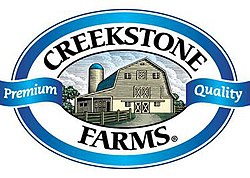Creekstone Farms Premium Beef
This article includes a list of general references, but it lacks sufficient corresponding inline citations. (April 2013) |
 | |
| Company type | private |
|---|---|
| Industry | Meat packing |
| Founded | 1995 |
| Founder | John and Carol Stewart |
| Headquarters | , United States |
Number of locations | 1 |
Area served | United States |
Key people | Keizo Kada (CEO) |
| Owner | Marubeni Corporation |
| Website | www |
Creekstone Farms Premium Beef, LLC is an American beef processing company located in Arkansas City, Kansas.
History
[edit]The company was founded in 1995 by John and Carol Stewart. Originally a purebred Black Angus farm in Campbellsburg, Kentucky, Creekstone Farms entered the processing business in 2003 with the purchase of a 450,000-square-foot (42,000 m2) processing plant in Arkansas City, Kansas. The company began processing Creekstone Farms Premium Black Angus cattle in May 2003. In the spring of 2004, it launched an additional line of Black Angus products, Creekstone Farms Natural Black Angus Beef. Stewart retired from the company in October 2007.
Creekstone Farms is currently owned by the Marubeni Corporation and was owned by Sun Capital Partners. When Stewart retired, he retained ownership of the farm in Kentucky, which has since been sold and no longer is connected to the Creekstone Farms brand. The company reports[when?] that Japan's ban on U.S. beef beginning in 2003 caused the company to lose a third of its sales, prompting the layoff of about 150 people.
BSE testing
[edit]Creekstone Farms is known for its attempt to test all of its beef for bovine spongiform encephalopathy (BSE, or "mad cow disease"). At a cost of about half a million dollars, Creekstone built a testing lab, the first inside a U. S. meat packing plant, and hired the necessary personnel. In 2004, however, the U.S. Department of Agriculture, which controls the sale of testing kits, refused to sell Creekstone enough to test all of its cows.
The USDA's stated position was that allowing any meatpacking company to test every cow would undermine the agency's official position that random testing was scientifically adequate to assure safety. The USDA also claims that testing does not ensure food safety because the disease is difficult to detect in younger animals. An alternative position is that the USDA's objection is the result of pressure from larger meatpacking operations. The president of the National Cattlemen's Beef Association told The Washington Post that "If testing is allowed at Creekstone, we think it would become the international standard and the domestic standard, too."[1] Creekstone Farms says tests cost about $20 per animal, increasing the cost of beef by about 10 cents per pound. The USDA currently tests about 1 percent of cattle slaughtered in the U.S.
Lawsuit
[edit]In March 2006, Creekstone filed a lawsuit against the USDA for refusing to allow complete testing. On March 29, 2007, Judges James Robertson of the U.S. District Court for the District of Columbia ruled that USDA had the authority to restrict the use of biological products and to regulate diagnostic testing but that this authority did not extend to the regulation of BSE test kits.[2] On August 29, 2008, the Court of Appeals for the District of Columbia Circuit affirmed the district court's finding of the USDA's authority to restrict the use of biological products and to regulate diagnostic testing but reversed the lower court's ruling that USDA did not have the authority to regulate BSE test kits.[3]
Notes
[edit]- ^ Marc Kaufman, "Company's Mad Cow Tests Blocked; USDA Fears Other Firms' Meat Would Appear Unsafe," The Washington Post, April 16, 2004, AO1.
- ^ Creekstone Farms Premium Beef, L.L.C. v. Dep't of Agric., 517 F. Supp. 2d 8, 13–17 (D.D.C. 2007).
- ^ Creekstone Farms Premium Beef, L.L.C. v. Dep't of Agric., 539 F.3d 492, 503 (D.C. Cir. 2008).
External links
[edit]- Official website (Press releases)
- News articles: 2006 2004 Archived 2006-06-18 at the Wayback Machine
- USAToday: Mad cow watch goes blind
- SFGate: Meatpacker Sues Feds Over Mad Cow Test
- US District Court for the District of Columbia decision
- Washington Post Brief
- http://video.cnbc.com/gallery/?video=1662029638&play=1
- https://www.nytimes.com/2010/03/24/dining/24beef.html?_r=1&pagewanted=all
